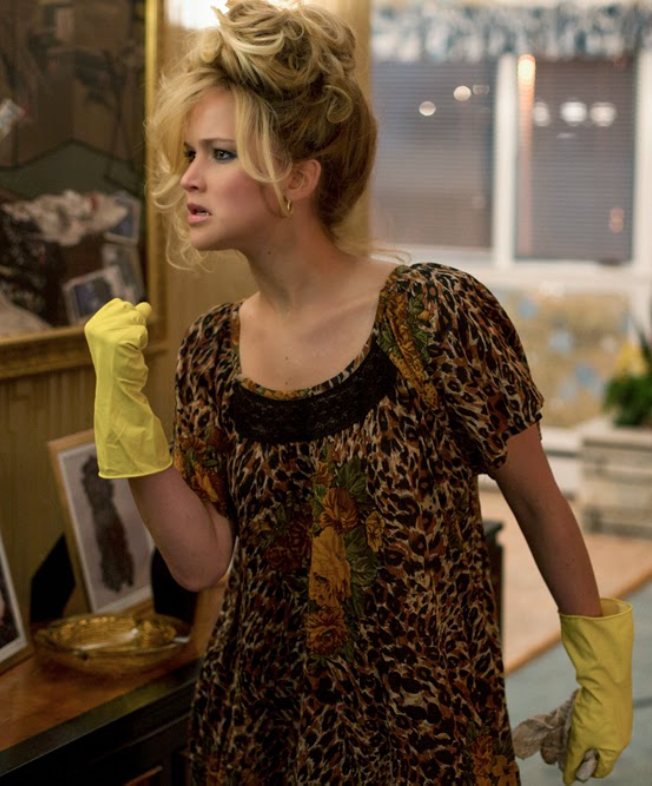 “Joy,” David O. Russell’s latest, is not an adaptation, though it would have benefited from being one. Based on the story of Joy Mangano, the real-life woman who invented the Miracle Mop and became a major entrepreneur on the QVC network, it is co-written by Annie Mumolo and Russell, who has said that he believes “strong women are the key to great cinema.” Certainly he puts his money where his mouth is. Even in his male-centric films like “The Fighter,” strong women run the show. But Mangano’s can-do spirit is somewhat muted by this muddle of a melodrama, which swings tonally between a Pedro Almodóvar-inflected telenovella, a 1990s update of “You Can’t Take It With You,” and a Preston Sturges comedy on a cutting-room floor. An antecedent memoir might have provided much-needed signposts.
“Joy,” David O. Russell’s latest, is not an adaptation, though it would have benefited from being one. Based on the story of Joy Mangano, the real-life woman who invented the Miracle Mop and became a major entrepreneur on the QVC network, it is co-written by Annie Mumolo and Russell, who has said that he believes “strong women are the key to great cinema.” Certainly he puts his money where his mouth is. Even in his male-centric films like “The Fighter,” strong women run the show. But Mangano’s can-do spirit is somewhat muted by this muddle of a melodrama, which swings tonally between a Pedro Almodóvar-inflected telenovella, a 1990s update of “You Can’t Take It With You,” and a Preston Sturges comedy on a cutting-room floor. An antecedent memoir might have provided much-needed signposts.
Jennifer Lawrence plays Mangano, which goes a long way toward cutting through the fog. Not since Julia Roberts has Hollywood found itself such a bright light, and Lawrence comes with the added benefit of being a strong actress who, at the ripe old age of twenty-five, has already shed any fear of un-likeability; she seems to take more cues from 1940s screwball dames than her less self-possessed contemporaries. As Mangano, she channels the weary brassiness of a woman who’s been soldiering her family’s burdens since before she was an adult. She even speaks in the clipped tones of a Barbara Stanwyck or Irene Dunne. (No vocal fry for this millennial.)
Joy lives in a ramshackle house also occupied by her two small children; her sweetly salt-of-the-earth grandmother Mimi (Diane Ladd); and her ex-husband Tony (Edgar Ramirez), a Venezuelan lounge singer who shares the basement with her Lothario father (Robert De Niro), who is the ex-husband of her mother (Virginia Madsen), a TV-obsessed shut-in who languishes on the second floor. Also underfoot: Joy’s resentful half-sister Peggy (Elisabeth Röhm), who works at their father’s auto body shop. Joy herself has toiled as an airline attendant since she scrapped her university plans after her parents’ divorce. 
Life is on a fast track to nowhere – even the physical foundation of her home is crumbling – when in a fevered dream Joy receives a vision of an absorbent, hands-free mop designed to liberate housewives from mucking up their manicures. After much bowing and scraping, she wheedles start-up money out of her father’s theatrically rich girlfriend (Isabella Rossellini, who seems poised to become another key Russell player), and convinces a QVC executive (Bradley Cooper, oddly asea here) to sell the product on-air. But even after Joy’s business venture blows up, her family remains a dangerous albatross whose messes she has to fix left and right. It’s an interesting study of the dark side of the American dream: a self-determination that’s deeply compromised by the ties that bind – family, sex, a shared survival instinct. Biology, basically.
In his own way, David O. Russell may be the most profoundly patriotic U.S. director working today. He’s hard on our country – in everything from “I Heart Huckabees” to “American Hustle” (even the ill-fated “Accidental Love,” which he disowned before its release) he satirizes our national greed and fraud. But notoriously hot-headed himself, he also admires our visceral impulses; witness the from-the-gut actors who are his main players. Here, he’s working through all these issues from a female perspective for the first time: Joy is a scrappy saint of capitalism; her grasping, selfish family, the shadow of the same economic system. (Families never get off easy in Russell films. Consider the Greek chorus that are the sisters of “The Fighter.)
 Frankly, I think the writer/director is shorted out by his good intentions here. In an effort to recover seemingly every genre ghettoized as “female” – from movie musical to fairy tale to melodrama – he buries his lady protagonist in a snow globe of tremulous violins and soft-focus flashbacks that wear us down rather than wake us up. Best are scenes when Lawrence’s plain-spoken bad-assery busts through this feminine product-colored maelstrom, but overall it’s as if Russell’s earnestness has trumped the sly wit that’s always been his saving grace. “Joy” may be worth watching, but more straight-up “herstory” would have been as miraculous as that mop.
Frankly, I think the writer/director is shorted out by his good intentions here. In an effort to recover seemingly every genre ghettoized as “female” – from movie musical to fairy tale to melodrama – he buries his lady protagonist in a snow globe of tremulous violins and soft-focus flashbacks that wear us down rather than wake us up. Best are scenes when Lawrence’s plain-spoken bad-assery busts through this feminine product-colored maelstrom, but overall it’s as if Russell’s earnestness has trumped the sly wit that’s always been his saving grace. “Joy” may be worth watching, but more straight-up “herstory” would have been as miraculous as that mop.
This was originally published in Word and Film.
